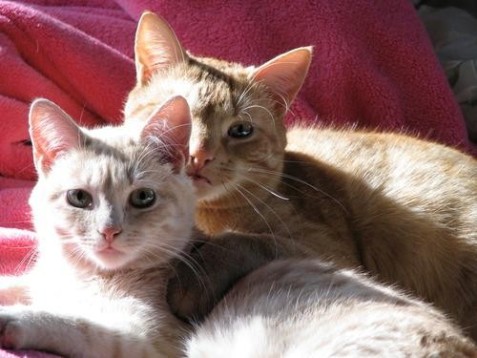Poor Arlo and Cream Puff. My two cats have – like their owner – eaten too many carbs over the last several months and are now on a diet. The extra pounds are noticeable: Arlo can’t jump as high or run as fast when chasing a cat toy; Cream Puff has become softer around the middle and her little head looks out of proportion compared to her rotund body. My vet relayed the bad news two weeks ago – each cat would need to get in shape and drop the excess pounds pronto to reduce their chances of diabetes or heart disease – the same chronic health problems that inflict obese humans. Approximately 68 percent of U.S. households, or 82.5 million homes, own at least one pet and more than half of our canine and feline friends are overweight or obese, according to the Association for Pet Obesity Prevention (APOP). Pets are simply following in the footsteps of their owners: 69 percent of U.S. adult Americans are overweight or obese says the Centers for Disease Control and Prevention.
Megan Rees, public relations director at Denver-based Dumb Friends League, a community-based animal welfare organization, says she’s seen an increase in the number of overweight cats dropped off at the shelter over the last decade. To help these cats lose weight, the League teamed up with pet food maker Hills for a “10-Week Turnaround” weight-loss challenge, during which they’re fed Hill’s Science Diet food). Some of the initial participants have not only met their weight-loss goals, they’ve also been adopted (the primary purpose of the challenge). During the challenge, the fat cats are sequestered in their own room at the shelter where staff members and volunteers carefully monitor the cats’ food intake and exercise them daily. There are six cats currently in the program and more will enter the as others are placed in permanent homes.
“People are hesitant to take home obese cats,” Rees told Yahoo Health. “Obese cats can be depressed, mope around, and won’t eat.”
Overweight pets might be extra cuddly, but they’re also more likely to suffer from osteoarthritis, high blood pressure, heart and respiratory disease, kidney disease, many forms of cancer, and decreased life expectancy.
“Pets gain weight for the same reasons adults and children do – too little exercise and too many calories,” APOP’s founder, Dr. Ernie Ward, told Yahoo Health. “We have to examine how often and what we’re feeding to our pets.”
According to Ward, pet treats, especially dog bones, are “calorie grenades.” A single treat can equal or exceed a pet’s daily caloric allowance and he blasts marketing campaigns for convincing owners to feed their pets appetizers and afternoon snacks.
“We over-treat our pets … if you give a cat or a dog or a treat for everything it adds up so quickly,” he noted.
Commercial dog food presents its own health challenges. Dog kibble tends to be high in carbs, which contain more calories per ounce than protein and have the ability to change the brain chemistry of dogs. Cats and dogs that are taken off high-carb, high-sugar diets exhibit many of the same reactions humans do: intense cravings and irritability. Dogs will pace and bark, while cats will bother their owners, explained Ward. “Pets can become addicted to food,” he said.
via How to Help Your Pet Shed Those Extra Pounds.



